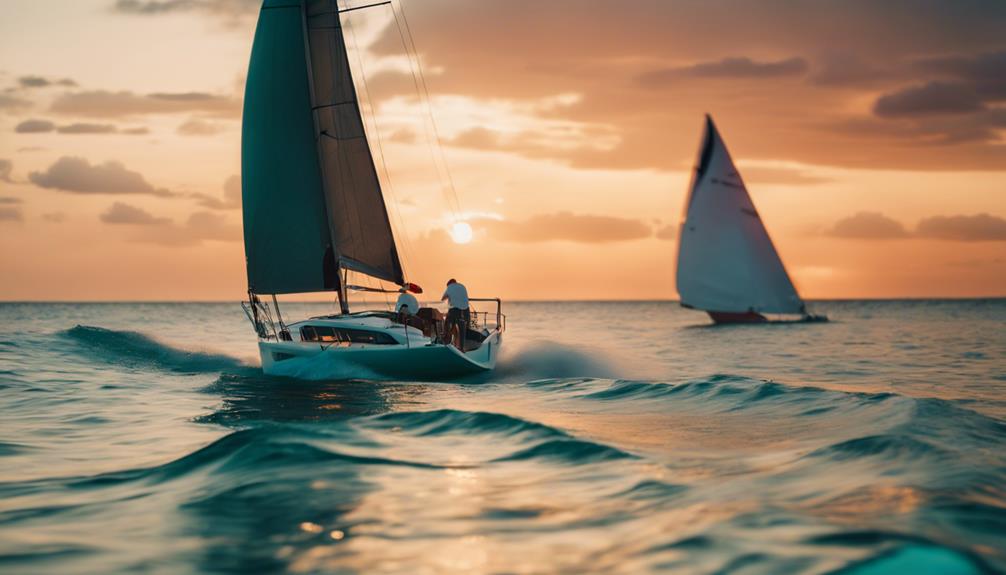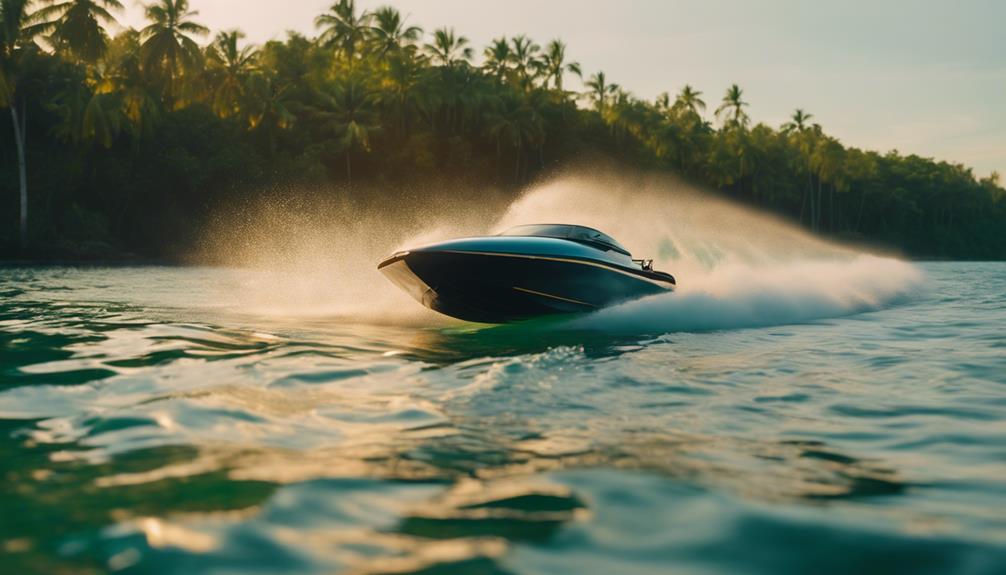When choosing between a sailboat and a powerboat, consider your priorities. Sailboats generally offer lower initial costs, reduced fuel consumption, and a deeper connection with nature. They require more planning and skill, making them great for adventurous souls. On the other hand, powerboats provide speed and convenience, ideal for quick trips or water sports. They're easier to operate and more spacious, but come with higher fuel costs. Ultimately, your choice depends on your desired boating experience and lifestyle. There's plenty more to explore to help you make the best decision for your needs.
Key Takeaways
- Sailboats are more economical with lower purchase, maintenance, and fuel costs compared to powerboats, making them a cost-effective choice.
- Consider your activity preferences: sailboats offer leisurely cruising, while powerboats excel in speed and water sports.
- Assess travel flexibility: sailboats require wind consideration, whereas powerboats allow for independent scheduling and access to shallow waters.
- Evaluate safety: sailboats have a significantly lower rate of fatal accidents, indicating a safer option for boating enthusiasts.
Cost Comparison Overview
When comparing costs, you'll find that sailboats are usually more budget-friendly to buy and maintain than powerboats. The initial purchase price of a sailboat often undercuts that of a powerboat, making it an affordable option for many buyers.
While larger sailboats can come with higher overall costs, their smaller engines typically lead to lower maintenance costs compared to the expensive engines found in powerboats.
One of the biggest savings comes from fuel consumption. Sailboats can travel long distances without the need for frequent fuel stops, especially in good weather. In contrast, powerboats heavily depend on fuel, leading to fluctuating operational costs that can strain your budget. As fuel prices rise, the expenses associated with running a powerboat can increase considerably.
Furthermore, insurance rates for sailboats are often lower than those for powerboats, contributing to ongoing savings.
Experience and Engagement Levels
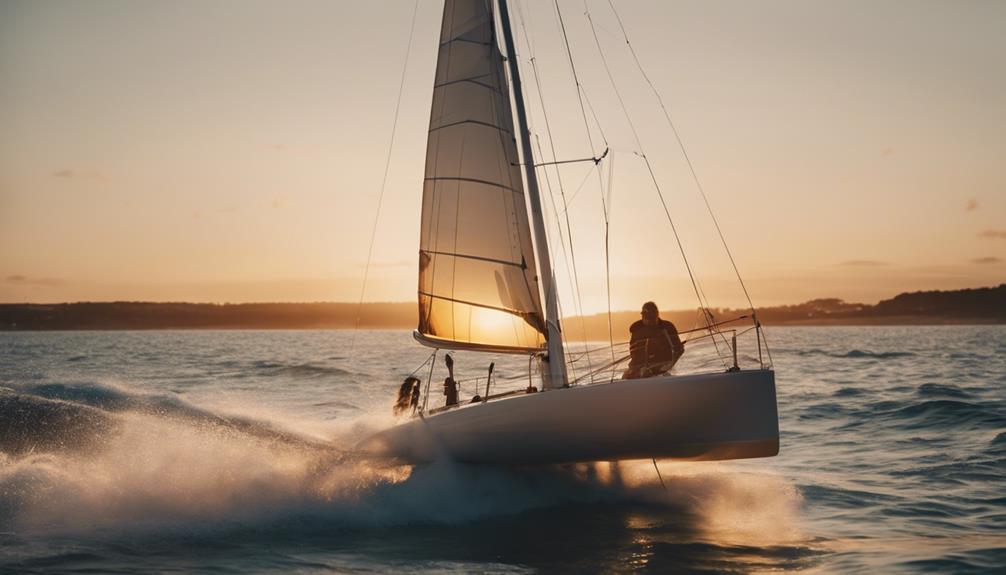
Choosing between a sailboat and a powerboat hinges on how much hands-on engagement and active participation you want in your boating experience.
If you crave adventure and a deep connection to nature, sailing offers a unique experience. You'll be actively involved in harnessing wind power, planning your route, and adapting to changing weather conditions. This hands-on engagement not only enhances your sailing skills but also fosters a profound appreciation for the environment around you.
On the other hand, powerboats provide convenience and speed. They allow you to reach your destination quickly with minimal training, making them ideal for those who prefer a more relaxed outing. If you want to enjoy the water without the complexities of sailing, powerboats might be the way to go.
Ultimately, your choice will reflect your personal preferences. Do you see yourself steering through the open waters, feeling the wind in your sails, or would you rather enjoy a straightforward ride, focused on getting to your destination? Understanding your desired level of engagement will help you decide whether the thrill of sailing or the ease of powerboating suits your needs better.
Flexibility in Travel Options

When you choose between a sailboat and a powerboat, consider how weather and fuel limitations affect your travel flexibility.
Sailboats require you to plan around wind conditions, while powerboats let you travel on your own schedule, regardless of the weather.
However, powerboats can restrict your range due to their fuel capacity, making it essential to think about where you want to go.
Weather Planning Necessities
Sailboat travel demands flexibility in your itinerary, as weather conditions can greatly influence your route and overall sailing experience. Unlike motorboats, which can maneuver regardless of wind, sailboats rely on favorable weather for their performance. This dependence means you need to prioritize careful planning and monitoring of weather forecasts before and during your journey.
Understanding wind strength and direction is essential. Experienced sailors often wait for ideal weather windows, emphasizing the importance of meteorological knowledge to enhance their sailing experience. For instance, if you're sailing in coastal areas like Chesapeake Bay, you'll encounter varied conditions that may enhance short-range cruising but require you to stay alert and flexible in your planning.
Historical sailing practices demonstrate that adapting to changing weather is key. You might find yourself altering your route based on unexpected shifts in wind or storms. By embracing this flexibility, you can enjoy a safer and more enjoyable sailing experience, making your journey not just about reaching a destination but also about traversing the ever-changing elements of nature.
Fuel Limitations Impacting Travel
Weather planning is just one aspect of sailing; fuel limitations also play a significant role in determining your travel options and flexibility on the water.
If you choose a sailboat, you'll enjoy the ability to travel long distances without needing frequent fuel stops, especially in favorable weather conditions. This allows for more extensive journey planning. However, you'll need to be mindful of wind conditions; calm days can limit your sailing opportunities, making motors a practical backup.
On the other hand, powerboats offer the advantage of spontaneity. They can operate regardless of wind direction, letting you travel quickly between destinations. This is particularly useful for short trips or when time is limited. Yet, keep in mind that powerboats have a finite fuel capacity, which can restrict your travel range, especially in remote areas.
Additionally, powerboats can navigate shallow water more effectively than deeper-draft sailboats, giving you access to coastal spots that might otherwise be off-limits.
Ultimately, your choice depends on how you prioritize flexibility, speed, and access to different types of water for your adventures.
Speed Preferences and Activities

When it comes to speed, your preferences can greatly influence your choice between a sailboat and a motorboat.
If you're after quick trips or adrenaline-pumping activities like water skiing, a powerboat might be your best bet.
However, if you enjoy the thrill of harnessing the wind and a more leisurely pace, sailing offers a unique experience that emphasizes the journey itself.
Travel Speed Comparison
While both sailboats and powerboats offer unique experiences, your choice will largely depend on whether you prioritize speed for quick outings or a more leisurely journey that emphasizes the beauty of the sailing experience.
When considering the travel speed comparison, here are some key points to think about:
- Powerboats typically cruise at 15-20 knots, perfect for quick trips or activities like water skiing.
- Sailboats can match or exceed wind speed under ideal conditions but focus on a slower, more scenic pace.
- The cruising experience on a sailboat highlights the journey, requiring favorable wind direction and often a wait for perfect water conditions.
If your idea of a perfect day on the water involves swift excursions and spontaneity, powerboats might be your best bet.
However, if you appreciate the rhythm of nature and the thrill of sailing, embracing the journey over speed will make sailboats more appealing.
Ultimately, your choice should align with how you envision your time on the water.
Activity Suitability Analysis
Choosing between a powerboat and a sailboat depends on the activities you enjoy and your speed preferences on the water. If you love thrilling speeds and quick excursions, a powerboat might be your best bet. However, if you seek a serene experience, a sailboat could cater to your desires.
Here's a quick comparison to help you decide:
| Activity | Powerboat | Sailboat |
|---|---|---|
| Speed | 15-20 knots | Variable, can exceed wind speed |
| Ideal Weather & Tides | Less affected | Requires planning for conditions |
| Experience | Easy operation | Skill development in navigation |
| Space and Comfort | Typically more spacious | Varies, often less comfort |
| Best for | Fishing, water sports | Leisurely cruising, nature lovers |
When weighing sailboat vs powerboat, consider your preferred activities. If speed is essential for fun outings or fishing, a powerboat aligns better with your needs. Conversely, if you appreciate the journey and the tranquility of sailing, a sailboat will enhance your activity suitability on the water.
Wind Conditions Influence
Wind conditions play a significant role in determining how much you can enjoy sailing, as they directly impact your speed preferences and the activities you can engage in on the water.
If you want to harness wind for power effectively, it's crucial to understand how to work with varying conditions. Your experience on a day on the water largely depends on how much wind is available.
In ideal travel scenarios, you'll find that sailboats can match or even exceed the speeds of motorboats. However, poor wind conditions can turn your plans upside down, making it necessary to have backup options like using the engine. This can be costly and frustrating.
Consider these factors when planning your sailing adventures:
- Wind strength: Determines your sailing speed and maneuverability.
- Weather patterns: Essential for planning around weather and ensuring a smooth trip.
- Location: Some regions, like Chesapeake Bay, offer more reliable winds than others.
Being aware of these aspects will enhance your sailing experience and help you make informed decisions.
Safety and Accident Statistics
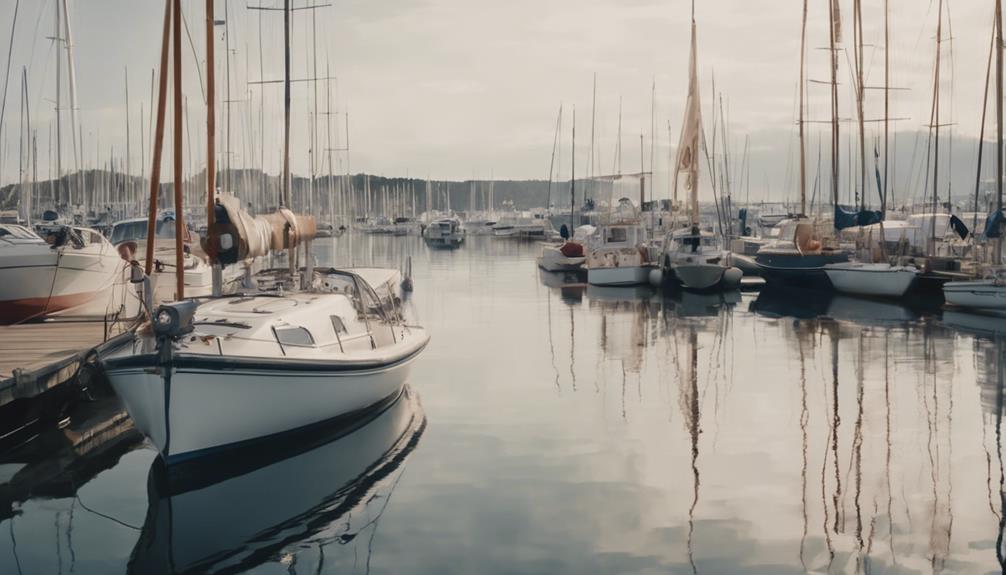
When it comes to safety, sailboats prove to be a much safer option than powerboats, as evidenced by boating accident statistics from 2020.
Sailboats accounted for less than 1% of fatal boating accidents, while powerboats represented over 50%. This stark contrast highlights the considerably higher risk associated with powerboat use, making sailboats a preferred choice for safety-conscious boaters.
Understanding safety practices and developing proper boat handling skills is essential for all boaters, regardless of the vessel type.
Both sailboat and powerboat operators need to be educated about accident prevention measures to guarantee safe experiences on the water. Resources are available to help first-time boat buyers navigate these safety essentials.
Powerboat Features and Benefits

Powerboats offer a range of features that cater to those who prioritize speed and convenience on the water. With their powerful engines, you can enjoy quick access to your favorite spots, traveling at speeds of 15-20 knots. They also provide ample deck and interior space, ideal for larger groups looking for comfort and relaxation.
- Easier handling: Operating powerboats requires less technical knowledge compared to sailing, making them user-friendly for everyone.
- Shallow drafts: Their design allows you to dock in shallow waters and access beaches effortlessly, enhancing your boating experience.
- Fuel tank capacity: While operational costs can be significant due to fuel reliance, understanding how much your fuel tank will carry can help you plan your trips effectively.
Sailboat Characteristics and Advantages
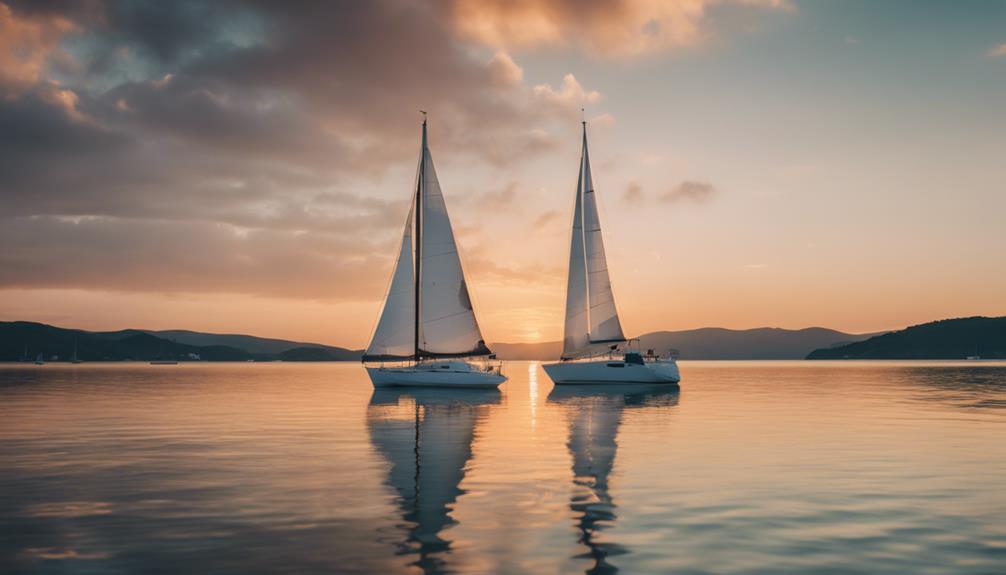
Sailboats offer a unique blend of adventure and tranquility, allowing you to harness the power of the wind while enjoying a more eco-friendly boating experience. By relying on wind power, sailboats minimize fuel use and lower operational costs, making them an attractive choice for budget-conscious boaters. You can travel long distances without worrying about fuel stops, leading to spontaneous adventures when conditions are just right.
One of the standout features of sailing is the quiet experience it provides. Without the noise of an engine, you can connect more deeply with nature and enjoy serene moments with friends and family. However, operating a sailboat does require some technical knowledge and planning. This challenge can be rewarding, as it helps you develop practical sailing skills and a deeper understanding of the craft.
While larger sailboats may be needed to match the amenities of powerboats, they usually involve lower maintenance and insurance costs, making them more economical in the long run. So, if you're looking for an environmentally friendly option that enhances your boating experience, consider the many benefits sailboats have to offer.
Making the Right Choice
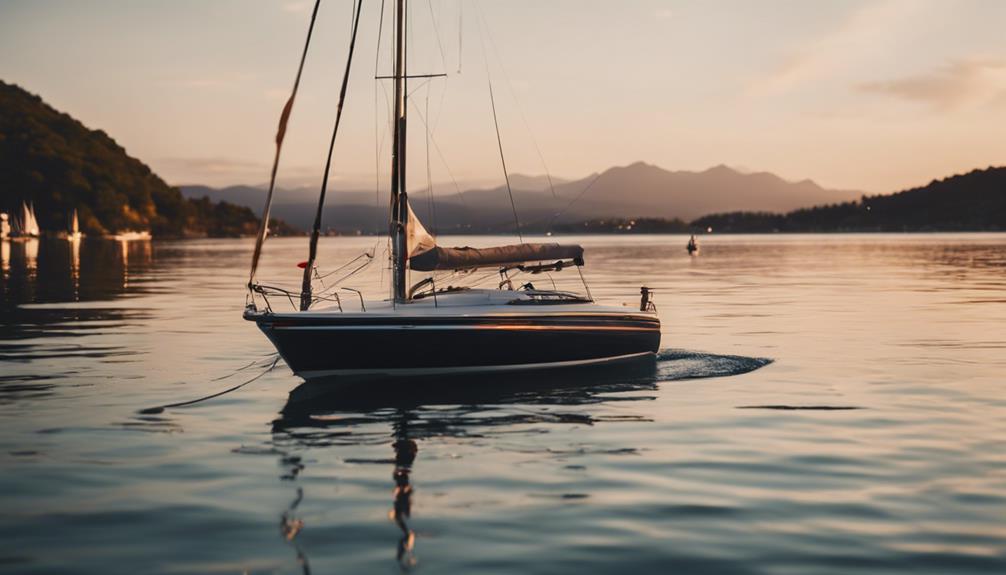
Choosing the right type of boat depends on your personal preferences, lifestyle, and how much you're willing to engage with the sailing experience. If you prefer hands-on participation, sailboats might be your ideal choice. However, if you want immediate enjoyment without much fuss, motorboats could suit you better.
Consider these factors when making the right choice:
- Travel Preferences: Sailboats excel in long-distance travel without fuel stops, while motorboats guarantee quick access to various destinations.
- Cost Factors: Sailboats typically have lower maintenance and fuel costs, although larger ones can be more expensive overall.
- Safety Statistics: With less than 1% of fatal boating accidents in 2020 involving sailboats, they're statistically a safer option compared to motorboats, which represented over 50%.
Ultimately, both options can be environmentally friendly, but your decision should align with your values and boating goals. So, weigh these factors carefully to find the boat that best meets your needs.
Frequently Asked Questions
Are Sailboats High Maintenance?
Sailboats aren't necessarily high maintenance, but they do require regular checks on sails and rigging. While their upkeep is often less costly than powerboats, you'll need to stay diligent about inspections and repairs.
Are Sailboats Safer Than Motorboats?
In 2020, sailboats accounted for less than 1% of fatal boating accidents. You'll find sailboats are generally safer than motorboats, as their design makes them more stable in adverse weather conditions, reducing accident risks considerably.
Which Is Better, a Sailing Yacht or a Motor Yacht?
When you're deciding between a sailing yacht and a motor yacht, consider your priorities. If speed and luxury matter most, a motor yacht's for you. If connection to nature and authenticity appeal, choose a sailing yacht.
Are Sailboats Easier to Maintain?
Yes, sailboats are generally easier to maintain. Their simpler propulsion systems mean fewer repairs and lower costs. While sails need attention, overall upkeep is typically less than that of motorboats, benefiting your wallet and time.
What Are the Key Factors to Consider When Choosing Between a Sail Boat and a Motor Boat?
When deciding between a motor boat vs sail boat, it’s important to consider factors such as your level of sailing experience, the kind of water activities you enjoy, and your budget. While a motor boat offers speed and convenience, a sail boat provides a more serene and traditional boating experience.
Conclusion
In the end, choosing between a sailboat and a motorboat often comes down to what you value most.
If you love the thrill of harnessing the wind and the tranquility of a slow sail, a sailboat might just be your perfect match.
On the other hand, if speed and convenience are your priorities, a motorboat could be your ideal companion.
Coincidentally, both options offer unique experiences, so consider what resonates with you and set sail on your next adventure!

